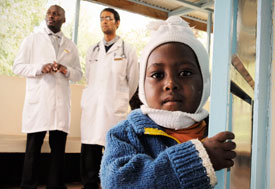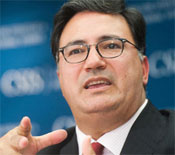USAID introduces strategic framework for global health
January / February 2012 | Volume 11, Issue 1

Photo courtesy of USAID
USAID's new strategic framework for success in
global health emphasizes greater interagency
collaboration, country ownership and smart service
integration.
Continued investments in maternal and child health and striving for an AIDS-free generation present the best opportunities for USAID, according to Dr. Ariel Pablos-Méndez, the development agency's Assistant Administrator for Global Health.
Pablos-Méndez recently introduced USAID's strategic framework for success in global health, a draft of which is circulating for comment among U.S. officials. Speaking at a Washington event hosted by the Center for Strategic and International Studies, Pablos-Méndez said the framework is designed to align the dynamic and complex set of national policies, directives, initiatives and other factors that influence the agency's operations into a more cohesive and strategic approach.
"This blueprint will ensure we are better able to adapt to changing realities and challenges, which are sure to present themselves in the years ahead," said Pablos-Méndez, a former Fogarty advisory board member, who assumed the government post in August 2011.
Economic realities and advances in technology are dramatically reshaping the availability, efficiency and cost of health care in the developing world. The new strategy is designed to allow USAID to respond to the forces that will directly and indirectly influence its ability to fulfill its mission.
Pablos-Méndez said that USAID's success over the next five years will be measured by contributions to saving lives among the poor and vulnerable, particularly mothers and children; strengthening health systems and technology innovation; and by providing inclusive leadership in global health and international development.

Photo courtesy of CSIS
Dr. Ariel Pablos-Méndez
"A core belief of the Global Health Initiative, reflected in the strategic framework, is that improving the health of mothers and children, and realizing an AIDS free generation, are areas that have a great potential for impact," he declared. President Obama's Global Health Initiative (GHI) "is now fostering greater interagency coordination, country ownership and smart service integration while aligning previous health initiatives for greater efficiency, namely the President's Malaria Initiative and the President's Emergency Plan for AIDS Relief," he added.
Pablos-Méndez described USAID's mission in global health as focusing on several key elements, including providing technical leadership in responding to global health challenges, partnering strategically with a wide range of actors, accelerating the development and introduction of innovative technologies, scaling up evidence-based and locally adapted health solutions, strengthening local health system capacity, promoting gender equality and female empowerment and working efficiently as effective stewards of public trust.
To support USAID's mission, Pablos-Méndez said the agency was "harnessing the technical excellence of its staff in implementation science; strengthening its country support, monitoring and evaluation and communications functions; and strengthening its work in health systems as well as in technology and innovation."
More Information
To view Adobe PDF files,
download current, free accessible plug-ins from Adobe's website.